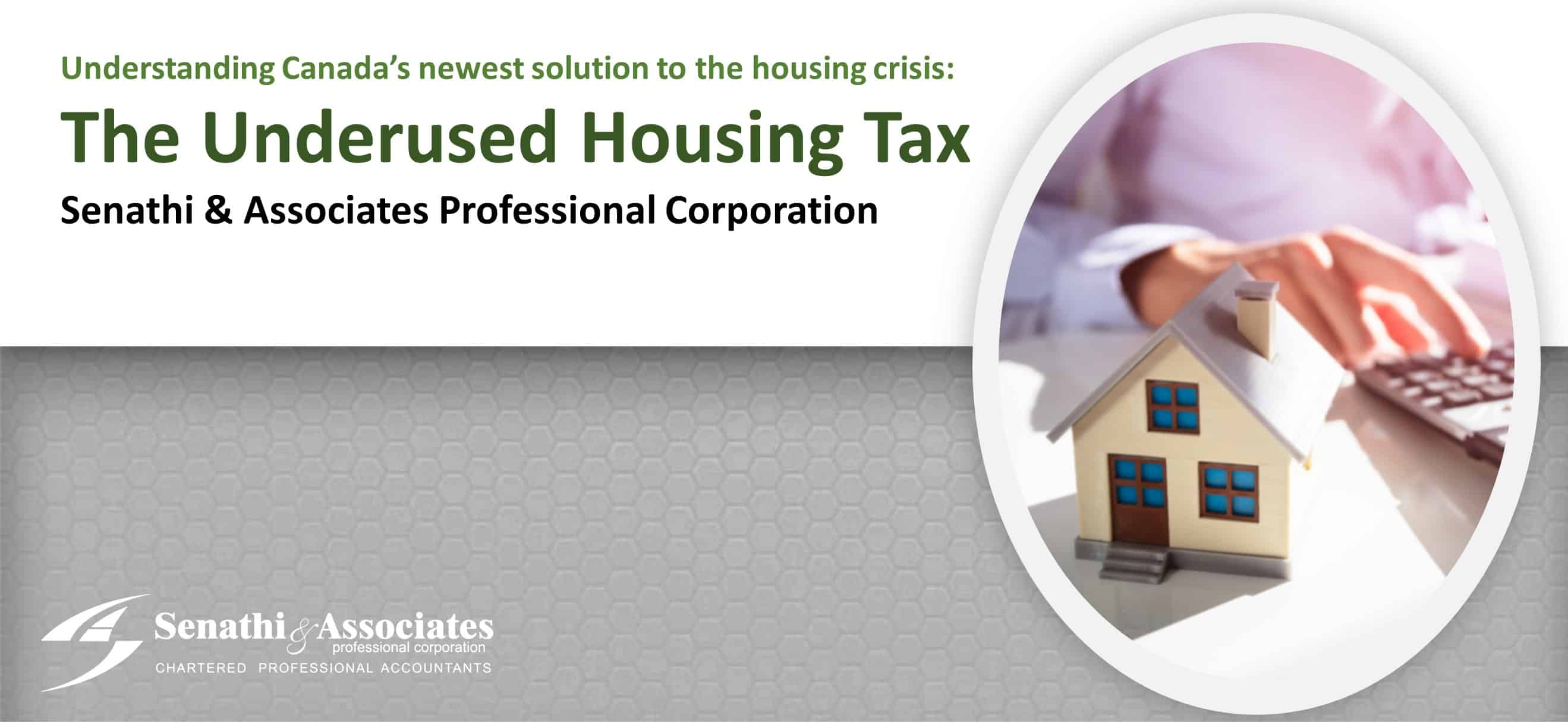Understanding the Underused Housing Tax for Canadians

What is it?
The Underused Housing Tax is a federal tax of 1% on the ownership of vacant or underused housing.
When is it due?
The UHT deadline for the 2022 calendar year is April 30th, 2024. Failure to submit your UHT return by the provided date can result in fines of $5,000.00 for individuals or $10,000.00 for Businesses.
Who is affected by the UHT?
The UHT qualification is divided into two categories; Excluded owners and Affected owners. If you are someone who meets any one of the following qualifications for an Excluded owner, you don’t have to file the UHT 2900 form. If you are someone who meets any one of the qualifications to be an Affected owner, you must submit a UHT 2900 form by the extended deadline stated above.
How do I know if I am Excluded or Affected?
The qualifications for an Excluded Owner are the following:
- An individual who is a Canadian citizen or permanent resident.
- Any person who owns a residential property as a trustee of a mutual fund trust, real estate investment trust, or specified investment flow-through (SIFT) trust for Canadian income tax purposes.
- A Canadian corporation whose shares are listed on a Canadian stock exchange designated for Canadian income tax purposes.
- A registered charity for Canadian income tax purposes.
- A cooperative housing corporation, hospital authority, municipality, para-municipal organization, public college, school authority, or university for Canadian GST/HST purposes.
- An Indigenous governing body or a corporation wholly owned by an Indigenous governing body.
- His Majesty in right of Canada or a province or an agent of His Majesty in right of Canada or a province.
The qualifications for an Affected Owner are the following:
- A foreign national (that is, an individual who is not a Canadian citizen or permanent resident)
- An individual who is a Canadian citizen or permanent resident, and who owns a residential property in Canada as a trustee of a trust.
- An individual who is a Canadian citizen or permanent resident, and who owns a residential property as a partner of a partnership.
- A corporation that is incorporated outside of Canada.
- A Canadian corporation whose shares are not listed on a Canadian stock exchange designated for Canadian income tax purposes.
- A Canadian corporation without share capital.
If you are an affected owner, you must file a separate UHT form for each residential property you have ownership of. If you are one of several affected owners of a residential property, all owners are required to file a UHT form as well.
Who qualifies for an exemption?
As per Canada.ca, if you are an affected owner, you may be entitled for an exemption.
The qualifications for an exemption for the UHT have been divided into the following categories:
- Type of owner
- Specified Canadian corporation.
- Partner of a specified Canadian partnership, or a trustee of a specified Canadian trust
- New owner in the calendar year
- Deceased owner, or a co-owner or personal representative of a deceased owner
- Occupancy of the residential property
- Used as a primary place of residence OR
- Used for qualifying occupancy
- Availability of the residential property
- If the property is any of the following, it may be exempt:
- Newly constructed
- Not suitable to be lived in year-round, or seasonally inaccessible
- Uninhabitable for a certain number of days because of a disaster or hazardous conditions, or a renovation
- If the property is any of the following, it may be exempt:
- Location and use of the residential property
- Only affected owners who are individuals qualify for this exemption
- A vacation property located in an eligible area of Canada and used by you or your spouse or common-law partner for at least 28 days in the calendar year
Although, qualifying for the exemption allows you to not pay the UHT, all affected owners are required to complete and submit the form by April 30th, 2024 for the 2022 calendar year.
For more information regarding your eligibility for an exemption of the UHT, please visit: https://www.canada.ca/en/services/taxes/excise-taxes-duties-and-levies/underused-housing-tax/who-file-pay.html#h_1_3
How to file?
The UHT 2900 (UHT tax form) can be submitted either electronically or through mail by a representative or by yourself.
As your trusted accountants, we can file your UHT for you, but if you do wish to file it independently, there are certain information/documents that you must have on hand during the process of the form completion.
As per the CRA, you must have the following information to fill out the UHT 2900 form:
- General contact details and addresses
- Tax Identifier Numbers
- Property ID used in the Land Registration System
- All ownership details who own 10% or more of that property
- The value of the residential property
- Exemption qualifications
- Tax payable calculation
The formula below is how the Tax Payable is calculated:
Value of the property
X Underused Housing Tax Rate (1%)
X Your ownership percentage
= UHT amount owed
For all inquiries/questions regarding the Underused Housing Tax, please call Senathi & Associates at (416) 479-0600 or email us at info@gtacpa.ca, and we’d be more than happy to be of assistance!

